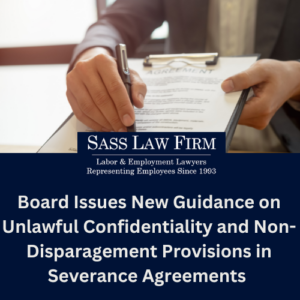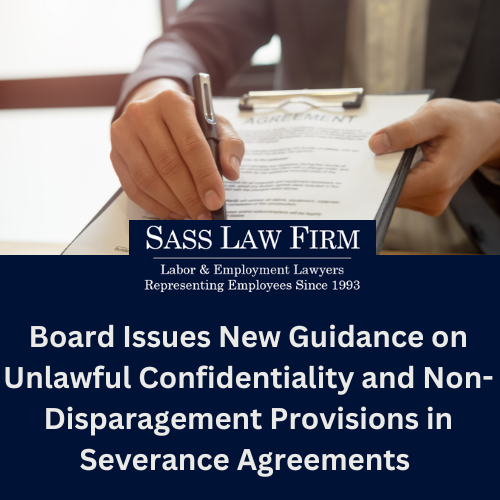In our last blog, we celebrated the decision in McLaren Macomb as a win for employees. In that decision, the National Labor Relations Board (NLRB) held overbroad confidentiality and non-disparagement clauses in severance agreements violated the National Labor Relations Act (“NLRA”). Check out our prior blog – Labor Board Rules Confidentiality and Non-Disparagement Provisions in Severance Agreements Unenforceable. Several questions arose about the practical implications of the decision. The NLRB General Counsel Jennifer Abruzzo answered many of these questions last week when she issued Memorandum GC-23 – Guidance in Response to Inquiries about the McLaren Macomb Decision (Mar. 22, 2023). This Guidance clarifies which employees are covered by the NLRA and what potential provisions of a severance agreement could violate the NLRA. Specifically, the memorandum answered the below questions.
My employer gave me a severance agreement that prohibits me from talking negatively or badly about my employer. Is this allowed?
 Restrictions in severance agreements on employees talking negatively about their employers are often referred to as non-disparagement clauses. The mere fact that the employer proposed a broad non-disparagement clause could constitute a violation of the NLRA because such a restriction could interfere with an employee’s exercise of his or her rights under the NLRA. These rights include discussing the terms and conditions of employment, wages, or supporting other employees in their workplace grievances for the mutual aid and benefit of the workers. This is true even “if the employee does not sign the proposed agreement,” the employer could still be in violation of the NLRA for proposing broad clauses in the first place.
Restrictions in severance agreements on employees talking negatively about their employers are often referred to as non-disparagement clauses. The mere fact that the employer proposed a broad non-disparagement clause could constitute a violation of the NLRA because such a restriction could interfere with an employee’s exercise of his or her rights under the NLRA. These rights include discussing the terms and conditions of employment, wages, or supporting other employees in their workplace grievances for the mutual aid and benefit of the workers. This is true even “if the employee does not sign the proposed agreement,” the employer could still be in violation of the NLRA for proposing broad clauses in the first place.
Does the new NLRB decision apply to supervisors who are provided a severance agreement with non-disparagement or confidentiality?
Generally, the protections of the NLRA apply only to non-supervisory and non-managerial employees. However, General Counsel Abruzzo’s Guidance recognizes that a supervisor may be covered under the NLRA if the provision prevents the supervisor from participating in NLRB investigations/proceedings and or opposing an unfair labor practice of the employer.
Do the new restrictions apply to agreements signed before the Board’s decision?
Yes. The Board’s decision finding non-disparagement and confidentiality provisions unlawful apply retroactively. If you have a severance agreement with these overbroad provisions, the NLRB advises that employers should reach out and advise employees with these agreements that the employer will not seek to enforce or penalize employees for a breach of pre-existing agreements.
Takeaways:
- The prohibitions on non-disparagement and confidentiality provisions generally only apply to non-supervisory/non-management employees but can apply to supervisory/management employees under limited circumstances.
- The NLRB’s decision applies retroactively.
- Other provisions in a proposed separation agreement may violate the law such as non-compete and/or non-solicitation clauses; no-poaching clauses; broad waivers and releases of liability; covenants not to sue; and post-termination cooperation clauses.
- If an employer violates the NLRA by including such provisions, this constitutes an unfair labor practice that must be filed with the NLRB within six months of the violation. Notwithstanding the six-month time deadline, if a former employee previously signed an agreement containing such unlawful provisions, then the NLRB will treat it as a continuing violation and the former employee could file an unfair labor practice beyond the six-month deadline.
If your employer presents you with a severance agreement or presented you with a severance agreement in the past, you should have these agreements reviewed by an experienced employment law attorney in your state. Sass Law Firm boasts experienced employment attorneys that routinely review severance agreements and represent employees in unfair labor practices before the NLRB.

